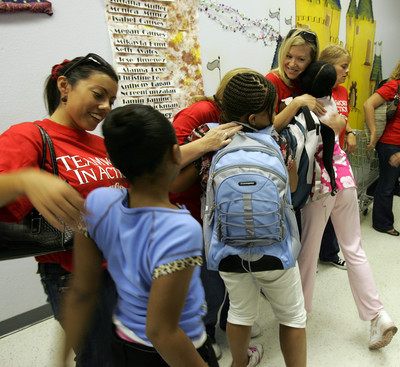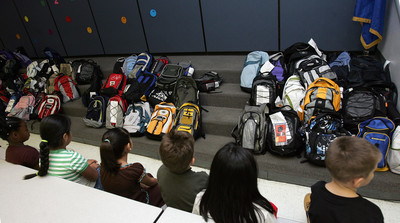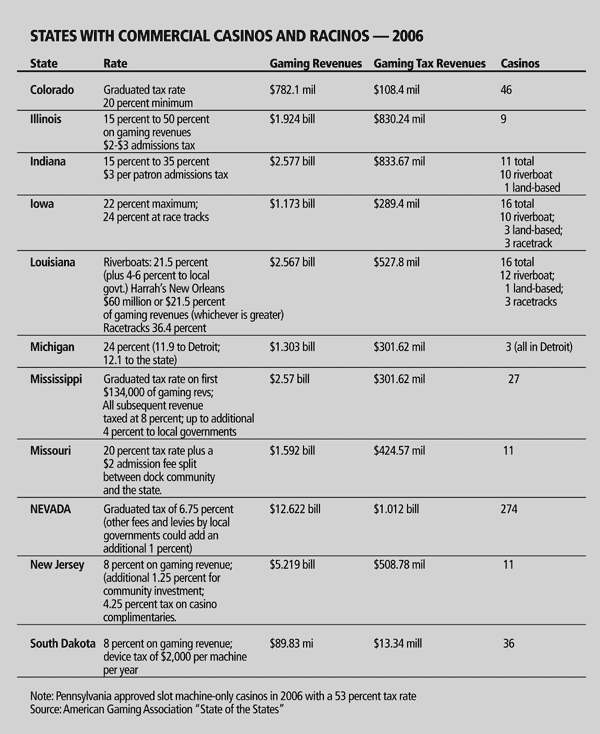Casino tax debate hot again
Top casino executives are lining up en masse to punch holes into any ballot initiative idea that would increase Nevada's tax rate of 6.75 percent on revenues earned through gaming.
The industry wants to drive home to voters that casinos contribute much more to the community than just a percentage of their overall gross gaming revenues -- a record $12.622 billion last year that translated into $1.012 billion in gaming taxes.
During fiscal 2006, casinos accounted for 34 percent of all sales and use taxes, 77 percent of the live entertainment tax and 34 percent of the liquor tax. Also, the state's room tax generated an estimated $415 million, predominantly coming from the major hotel-casinos.
Casinos also participate in charitable efforts and community relations activities.
However, the head of Nevada's top casino trade association said the message has been poorly communicated to new residents and long-time Nevadans who don't pay as much attention to state financing issues.
"When we did focus groups and showed people what gaming contributes, they came away with two messages to us," Nevada Resort Association President Bill Bible said. "They asked us why they didn't know this and why we weren't telling people."
The matter has become even more problematic in recent weeks.
Two potential initiative campaigns have surfaced that could kick up the gaming tax by 3 percentage points or more. One proposal, by Las Vegas attorney Kermitt Waters, would use an average of what casinos pay in taxes in other states while eliminating residential property taxes.
The Nevada State Education Association, which counts some 28,000 teachers as members, said last week it would seek passage of a ballot measure to make the gaming tax 9.75 percent on all casinos that report monthly gaming revenues of $1 million or more.
The proposals have gaming leaders seething and feeling singled out.
"I think they are taking a simplistic approach of funding," Las Vegas Sands Corp. President Bill Weidner said. "We love the teachers and they do a terrific job, but they are not being well-guided by their union. The gaming tax is just one outlet."
Harrah's Entertainment Senior Vice President Jan Jones said because big gaming has not adequately explained its material and intangible contributions to state residents, the industry is under fire.
"Rather than doing a thoughtful analysis of what we need to do with the state, everyone is throwing initiatives on the ballot, and that falls in the face of sound public policy," said Jones, a former two-term Las Vegas mayor. "The initiative process doesn't take into case a lot of issues considered for funding. It doesn't look at what the negative consequences might be."
Wall Street is also weighing in on a potential increase to Nevada's gaming tax. Using the time-worn phrase of "killing the golden goose," Deutsche Bank gaming analyst Bill Lerner said in a Sept. 18 note to investors that any increase in Nevada's gaming tax was a bad idea, possibly affecting nongaming revenues for casino companies and reducing those companies' values in the eyes of investors.
"We do not believe the authors of the education-oriented gaming tax proposal have given any serious consideration to its long-term impact, which we believe to be negative," Lerner wrote in a subsequent note released Friday. "We think any gaming tax increase would be disastrous."
Frank Streshley, senior research analyst for the Gaming Control Board, said the teachers' initiative would create a fourth tier in Nevada's three-tier gaming tax system.
Casinos that report monthly gaming revenues of $50,000 or less are now taxed at 3.5 percent. Casinos with $84,000 in gaming revenue are taxed at 4.5 percent. Any casino with revenue of more than $134,000 a month falls into the 6.75 percent category.
The initiative would establish a tax rate of 9.75 percent for casinos with monthly gaming revenues of more than $1 million.
Streshley said that on average, there are approximately 124 casinos statewide with more than $1 million in monthly gaming revenues. The union believes the percentage increase could translate into more than $250 million a year in additional taxes.
Bible, speaking in opposition to the teachers' initiative, said casino taxes already fund roughly one-third of the state's overall education budget. He said it was unfair to place an additional burden on one industry.
Lynn Warne, president of the teachers association, said the union's board realized it would face considerable opposition from the industry. However, board members believed the biggest casinos, which haven't seen an increase in the gaming tax since a half-percent boost came out of the 2003 legislative session, could afford to pay more.
"We're not looking at the small casinos, just the largest casinos in the state," said Warne, who has been president of the union for just three months and was a fourth grade teacher for 20 years. "Nevada is 49th in educational funding and I know the casinos say they contributed one-third of that money. But one-third of nothing isn't much of anything. We have an inadequate budget."
Compounding the tax issue are the casino projects Nevada's leading gaming companies are undertaking in states where gaming taxes are significantly higher. But gaming leaders say it's an unfair comparison. Nevada is the only state where a free-market approach is taken toward gaming. Other states limit competition, either through higher taxes or by limiting the number of gaming licenses.
Gaming leaders have said the size of a state's gaming tax plays a role in capital investments. MGM Mirage, for example, is spending $7.4 billion on its 76-acre CityCenter development. The company has not bid on licenses in other emerging domestic markets, such as Pennsylvania, where the tax rate is 53 percent.
Las Vegas Sands is spending $1.8 billion to open the Palazzo in December on the Strip, while at the same time, is spending $600 million on a casino development in Bethlehem, Pa.
Pennsylvania awarded only five casino licenses and limited the gaming to just slot machines.
"We're still going to build a very nice place, but I have a virtual monopoly in that market," Weidner said. "Every other place in the country is exactly the same way. There are high barriers to entry."
MGM Mirage Senior Vice President Alan Feldman said his company has been selective about its investments outside of Nevada. MGM Mirage operates 10 Strip casinos, the most of any gaming company. Also, MGM Mirage is planning several other Strip resorts being besides CityCenter. The company recently opened the $800 million MGM Grand Detroit.
"It's a high tax rate (in Michigan), but, there are only three casinos in Detroit," Feldman said. "It's frustrating because Las Vegas has grown, but the nongaming businesses that have come here have developed a 'don't tax us' political network. They come here, make all kinds of money, and don't pay for roads, schools, hospitals or libraries."
The Nevada Resort Association realized earlier this year that it needed some community outreach. A television advertising campaign showing how a portion of dollars gambled are funneled to education has aired for several months. The Association-produced 2007 Nevada Gaming Fact Book, which spells out gaming's financial contributions to the state, recently and historically, is about to roll off the presses.
In addition, Bible is pushing for a better explanation of the state's monthly gaming revenues, which are released by the Gaming Control Board and show what casinos collect from gamblers. Last week, the agency said casinos statewide collectively had gross revenues of $1.016 billion in August, which was off more than 4 percent from a year ago.
"People confuse revenues with profits," said Bible, a former Gaming Control Board chairman. "The numbers don't really tell the health of the industry. The gaming win reflects gross revenue before taxes and other expenses, such as salaries."
During the last legislative session, Las Vegas Sands proposed a plan where room taxes would be used for statewide transportation needs, rather than funding the Las Vegas Convention and Visitors Authority. Weidner said during 2007's first six months, gaming taxes rose roughly 2 percent while room taxes had climbed about 7 percent. He wouldn't say, however, if the company would propose the same plan in the 2009 session, directing the taxes toward education.
"Room tax is a huge and growing source of revenue, more than anyone ever could have imagined," Weidner said. "I submit to you that focusing increasing a tax increase on one tax is a dumb way to do things."
Contact reporter Howard Stutz at hstutz@reviewjournal.com or (702) 477-3871.



















